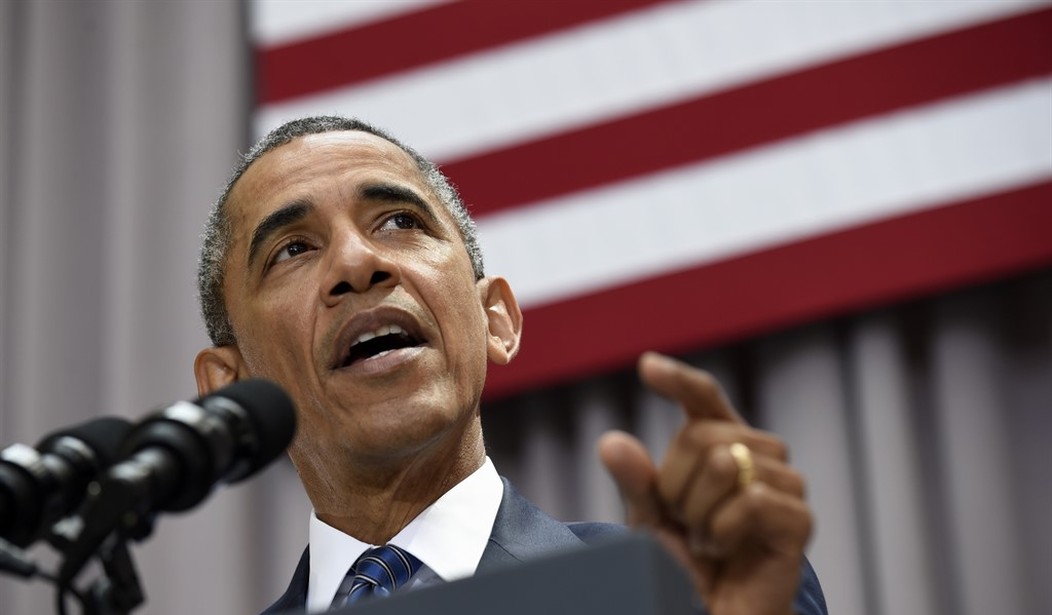Today, the president spoke for nearly an hour at American University to drum up support for his Joint Comprehensive Plan of Action (a.k.a Iran deal) with Iran regarding its nuclear weapons program. The speech was long, nauseating, and dotted with bits of anger towards President Obama’s opponents with this agreement.
As Dan wrote, the president said, “This is the strongest, non-proliferation agreement ever negotiated. And because this is such a strong deal, every nation that has commented publicly, with the exception of the Israeli government, has expressed support.”
At the same time, the president also said he knows how easy it is to feed into people’s fears, though he pretty much said that if Congress rejects this deal, there’s going to be some sort of war.
“The choice we face is ultimately between diplomacy and some form of war…Walk away from this agreement, and you will get a better deal ... for Iran,” he said.
Yet, the most outrageous part of the speech–though there were many such moments–came when the president actually said that the Republican caucus shared a “common cause” with Iran’s hardliners in rejecting this deal (via RCP):
Just because Iranian hard-liners chant 'death to America' does not mean that that's what all Iranians believe … In fact, it's those hard-liners who are most comfortable with the status quo… "It's those hard-liners chanting ‘death to America’ who have been most opposed to the deal…they're making common cause with the Republican caucus.”
“They’re making common cause with the Republican caucus.” – Obama on “Death to America” Iranian hardliners.
— Noah Rothman (@NoahCRothman) August 5, 2015Recommended
Again. It would be nice if we had a president who didn’t talk about his Iran deal like he was a daily kos blogger.
— Eli Lake (@EliLake) August 5, 2015In Iran, the people inside the system who are negotiating a deal, such as Foreign Minister Javad Zarif, must take the agreement to Iran's supreme leader, Ayatollah Ali Khamenei, for approval. In Iran, the hardliner approves the deal.
In the U.S. system it's the other way around. Senators like Marco Rubio, Tom Cotton and Ted Cruz support amendments that would set new conditions before lifting Congressional sanctions on Iran. But there are not enough votes in the Senate to overturn an Obama veto on the legislation if these amendments are attached. In other words, Obama frames the conversation in the U.S., because he has the power to ignore his hardliners whereas Zarif is obliged to placate his.
Then there is the substance of the amendments themselves. Democrats and Republicans have derided certain Republicans' amendments to the bill as "poison pills," aimed at making a deal with Iran impossible. But these amendments would require Iran to end its war against its neighbors, release U.S. citizens who have been jailed and recognize the right of the world's only Jewish state to exist. Outside the context of Iran negotiations, these are hardly radical views. Obama has expressed support for these positions himself.
Compare those demands with those of the Iranian hardliners. Gen. Hassan Firouzabadi, the chief of staff of Iran's armed forces on Sunday reiterated the red line that no military installations would be accessible for international inspections. This would pose a problem, given that the U.S. and other great powers have agreed to allow Iran to keep most of its nuclear infrastructure in exchange for tough inspections. The Iranian hardliners appear to be putting back in play something Obama's team believed was already agreed.
The most important distinction between Iran's hardliners and America's hardliners however is their political legitimacy. Iran's people have supported reform, but nonetheless the country's Revolutionary Guard Corps and domestic spy agency have tightened the grip on power despite elections when reformers won the presidency.
[...]
Obama had threatened to veto legislation that would give Congress a chance to review, but not modify, any agreement the administration reaches with Iran and five other world powers. Now the president says he will sign the legislation, but only if it doesn't include the kinds of amendments favored by the so-called hardliners. After all, those amendments are unacceptable to the hardliners who actually have sway -- in Iran.
After the speech, commenters noted how the president did this speech to possibly stop the bleeding on his own side of the aisle. Today, Rep. Steve Israel (D-NY), the highest-ranking Jewish Democrat in the House said he was a “no” vote on the deal, according to the Hill. They also report that Reps. Nita Lowey (D-NY) and Ted Deutch (D-FL) are joining him in opposition. Sen. Chuck Schumer (D-NY) has signaled he might vote against the deal. Sen. Bob Menendez (D-NJ) has been skeptical as well, saying that the Iran deal “preserves” its nuclear program. Moreover, ABC News reported in July that the deal made the New Jersey Democrat “anxious.”
Yet, Schumer is the highest-ranking Jewish Senator, and he’s probably going to be the Democrats’ leader in the Senate upon Harry Reid’s retirement. As the LA Times noted, if he decides to go against Obama, he will take a lot of Democrats with him.
“I’m not going to let pressure or politics or party influence my decision,” he said.
In all, this speech will probably do little to stop the diaspora of Democratic support. Now, the maneuvering, the incessant phone calls, and the vote counting begins, but the notion that the Republican caucus somehow shares a ‘common cause’ with the Iran’s brutal hardliners is laughable at best.
Obama: Iran "*includes* leaders that deny the Holocaust." Pretty much the entire leadership of the country...
— Josh Kraushaar (@HotlineJosh) August 5, 2015Last Note: Vote on the Iran deal will not occur until after the August recess. Oh, and apparently, the Obama administration has been warning Jewish leaders that if Congress rejects the deal, "rockets will fall on Tel Aviv."

























Join the conversation as a VIP Member